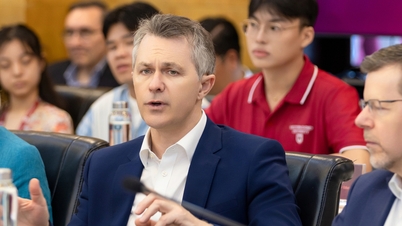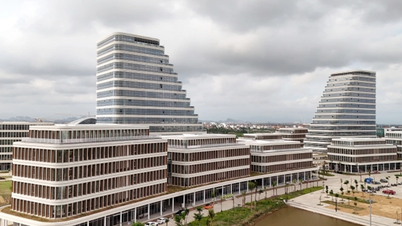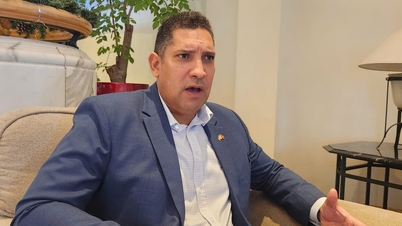Ms. Tran Thi Le (40 years old, Hung Yen ) has a daughter who just graduated from high school, achieving over 24 points in the D01 subject combination (Mathematics, Literature, English), a score sufficient for admission to many top public universities. However, her daughter is one of more than 310,000 candidates this year who "rejected university admission," simply because of the financial aspect.
"If our child studies in Hanoi , it would cost at least 10 million dong per month for rent, food, transportation, and tuition. That's at least 100 million dong a year – a sum far beyond our means," Ms. Le said, adding that the income from her few acres of rice paddies and her husband's work as a construction laborer is insufficient to cover the annual expenses of 100 million dong.
The couple spent many sleepless nights, facing a difficult decision: they had to persuade their child to temporarily put aside their dream of attending university and instead study Japanese, planning to work in Japan as recommended by an acquaintance.
"Understanding the difficulties our family is facing, my child nodded in agreement to our decision, even though I know she's very sad inside. I feel both pity and guilt for not being able to give her a complete education as promised," the mother said , her voice choked with emotion.

Many universities are increasing tuition fees for the 2025-2026 academic year. (Illustrative image)
That decision was not easy for Ms. Le, because every parent wants their child to receive a proper education right after leaving high school. However, for many rural families like hers, economic realities force them to choose a roundabout path: letting their children become financially independent and gain life experience early on, and then, when conditions allow, they can return to university to continue pursuing their dreams.
Ms. Nguyen Thi Thanh's family (43 years old, Ninh Binh) is in a similar situation. She recounted that a few days before her son registered his preferences, the family still thought, "If he gets accepted, we'll figure things out later." As the date of the admission results announcement approached, Ms. Thanh became increasingly worried because she couldn't find a solution to her financial problem.
Both she and her husband are factory workers with low incomes. Her husband recently recovered from a prolonged illness and is not yet able to return to work. Their savings are meager, and the cost of living for a student studying far from home is increasingly expensive.
“It costs around 8-10 million VND a month, including tuition and living expenses. Four years of university will probably cost several hundred million VND, not to mention if my child studies a field with a lot of practical work, books, and materials will be even more expensive. My husband and I are factory workers, our combined income is less than 15 million VND, we struggle to make ends meet for the whole family, where would we find the money for our child's education?” Ms. Thanh said, her voice choked with emotion.
What worries Ms. Thanh the most is not just the cost of tuition, but the uncertainty after graduation. "I know many students who finish school still end up working as factory workers. Meanwhile, those from wealthier families are able to invest in additional skills training and foreign language courses, which then gives them better opportunities. My family can't afford that," the worried parent shared.
For many years, Ms. Thanh has always encouraged her children to study hard so they could escape the hardships their parents faced. She never thought she would have to tell her children to give up their dream of going to university. However, with the news of continuously rising tuition fees at universities, she realized that this could very well become a reality.

Many families are worried about investing in their children's college education. (Illustrative image)
In light of the current situation where many universities are simultaneously increasing tuition fees, Dr. Le Viet Khuyen, Vice President of the Association of Vietnamese Universities and Colleges, believes that this could inadvertently exclude capable students who lack the financial means to attend.
According to Mr. Khuyen, upgrading facilities and improving the quality of training are necessary, but tuition fees also need to be calculated appropriately to the financial capabilities of students. "We cannot simply look at university tuition fees abroad and mechanically apply them to Vietnam; we must base it on the average per capita income in the country, which is still low compared to many countries in the region, " Mr. Khuyen emphasized.
He suggested that the Ministry of Education and Training should coordinate with relevant ministries and agencies to conduct a comprehensive review, thereby determining a reasonable and sustainable tuition fee roadmap. Regarding educational institutions, according to Dr. Khuyen, it is necessary to continue diversifying scholarship and student loan sources, while also implementing policies to waive or reduce tuition fees for students from disadvantaged backgrounds and those eligible for social welfare programs. This is not only a social responsibility but also a factor in expanding educational opportunities for vulnerable groups.
"Universities cannot use the excuse of autonomy or improving training quality to 'invent' various costs and then impose excessively high tuition fees. If tuition fees are not commensurate with the income level of the people, children from poor families will find it increasingly difficult to access university education," Dr. Khuyen warned.
For the 2025-2026 academic year, many universities plan to increase tuition fees for standard programs. The maximum increase proposed by the universities is mainly between 10-15% per year.
The National Economics University anticipates tuition fees for students enrolling in the 2025-2026 academic year to be 18-25 million VND for the standard program, an increase of 2-3 million VND compared to last year. According to the university's tuition fee increase schedule, the increase each year is 10%.
Tuition fees at the Banking Academy are expected to be around 26.5-28 million VND per year for the standard program and 40 million VND for the high-quality program, an increase of 1.5-3 million VND compared to last year. The school stated that the increase will not exceed 15% per academic year.
Meanwhile, applicants to the Dentistry program at Phenika University saw the highest increase, from 96 million VND last year to 128 million VND this year.
Source: https://vtcnews.vn/hoc-phi-tang-cha-me-nghen-ngao-khuyen-con-tam-gac-giac-mo-dai-hoc-ar958467.html



![[Photo] Prime Minister Pham Minh Chinh holds a phone call with the CEO of Russia's Rosatom Corporation.](/_next/image?url=https%3A%2F%2Fvphoto.vietnam.vn%2Fthumb%2F1200x675%2Fvietnam%2Fresource%2FIMAGE%2F2025%2F12%2F11%2F1765464552365_dsc-5295-jpg.webp&w=3840&q=75)
![[Photo] Closing Ceremony of the 10th Session of the 15th National Assembly](/_next/image?url=https%3A%2F%2Fvphoto.vietnam.vn%2Fthumb%2F1200x675%2Fvietnam%2Fresource%2FIMAGE%2F2025%2F12%2F11%2F1765448959967_image-1437-jpg.webp&w=3840&q=75)














































![[OFFICIAL] MISA GROUP ANNOUNCES ITS PIONEERING BRAND POSITIONING IN BUILDING AGENTIC AI FOR BUSINESSES, HOUSEHOLDS, AND THE GOVERNMENT](https://vphoto.vietnam.vn/thumb/402x226/vietnam/resource/IMAGE/2025/12/11/1765444754256_agentic-ai_postfb-scaled.png)




















































Comment (0)